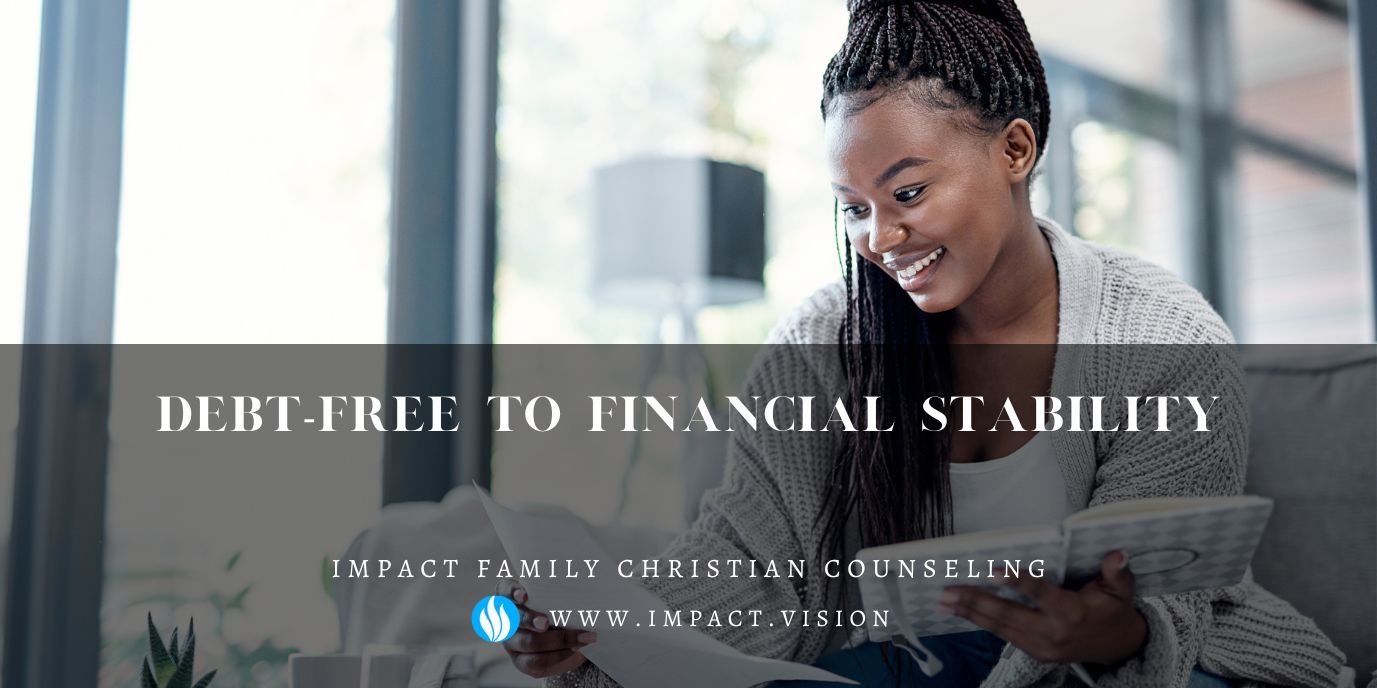Debt-free to Financial Stability

Debt-free and financial stability are closely related, as debt-free can be a key component of financial stability. If you want to be free from debt and be financially stable, not make regular payments or high-interest rates, there are a few options that you will consider after reading this article.
Big numbers like $5,220, $21,000, and $17,000 are fascinating, but they represent the average amount of debt Americans hold. Credit card balances and auto, student, and personal loans make up this enormous sum of money, according to the 2021 Experian study. Reaching a debt-free status in certain situations is understandably challenging, but with the right strategies and mindset, it is possible to achieve.
Financial stability provides a sense of security and peace of mind. This enables you to live your chosen lifestyle and follow your aspirations and objectives. It can also release you from the restrictions of financial worries so that you can make decisions about your life, such as choosing a career or establishing a family. Furthermore, being financially stable will help you deal with emergencies or obstacles, such as unforeseen medical expenses or a job loss. In the end, having financial security can make your life more satisfying, stress-free, and debt-free.

Is being in debt a bad thing?
Debt is not inherently “bad,” as it can be a valuable tool for financing large purchases or investments that might not be possible to pay for in cash. However, having too much debt or not being able to manage your debts effectively can be a problem. A few potential downsides of carrying too much debt are high-interest rates, limited financial flexibility, financial stress, and damage to your credit score.
Why is it hard to be debt-free?
- Only making minimum payments: Some people may only make the minimum payments on their debts which can be a risky financial strategy, as it can take longer to pay off your debts and cost you more in interest over time. You do this by paying the smallest amount you are required to pay. Paying the minimum amount may seem like a good deal, but it makes the overall cost higher.
- Using credit cards to pay off other debts: Some people may turn to credit cards to pay off other debts, but this can be risky as it can lead to even more debt if not managed carefully. You will now have both the original debt and the credit card debt to pay off, which is not a good lead to a debt-free life.
- Taking on more debt to pay off existing debts: Some people may take on additional debts, such as personal or payday loans, to pay off their debts. This can be a risky strategy, leading to even more debt and making the situation more difficult to resolve.
You can become debt-free and financially stable as you avoid these common mistakes. Knowing what mistakes you’re making is vital to start improving that. Knowing what makes your non-debt-free life longer is one essential part of changing.
What are the benefits of a debt-free life?
With effort and a willingness to improve your financial habits, it is possible to lead a debt-free life. Being debt-free might be difficult as it involves self-control and intelligent money management. There are several ways to manage your money to achieve financial freedom, and here are some excellent points on why you should manage your money wisely.

- Financial security: By managing your money wisely, you can build a financial cushion and prepare for unexpected expenses or economic challenges.
- Ability to reach financial goals: Whether you want to save for retirement, buy a home, or pay for your children’s education, to manage your money wisely can help you achieve your financial goals.
- Reduced financial stress: Wise money management can help reduce financial stress, as you’ll feel more in control of your finances and be better able to meet your financial obligations.
- Improved credit score: Managing your money can also help improve your credit score, as it shows lenders that you’re responsible with credit and can be trusted to pay back loans.
As Proverbs 21:20 says, “In the house of the wise are stores of choice food and oil, but a foolish man devours all he has,” it is crucial to be smart with your finances and to save for the future. Here are a few things to remember when you are not living a debt-free life.
- Don’t ignore the problem: It can be tempting to ignore your debt or hope that it will go away on its own, but ignoring the problem will not make it go away. It’s important to face your debts head-on and devise a plan to pay them off.
- Create a budget: A budget can help you understand your financial situation and make a plan for how to pay off your debt. You can start by tracking your income and expenses for a month, as this will give you a good idea of where your money is going and where you might be able to cut back. From here, set priorities and make a plan where you can be flexible.
- Prioritize paying off high-interest debt: It can be helpful to focus on paying off high-interest debt first, as it can save you money in the long run. Start by writing down all your debts, including creditor, interest rate, and minimum monthly payment for each. Then decide how much you will pay that is more than the minimum each month.
- Consider consolidation: If you have multiple debts with different interest rates, consolidating them into a single loan with a lower interest rate can make managing and paying off your debt easier.
- Seek professional help: If you’re having trouble paying off your debt, consider seeking professional help from a financial advisor or a counselor. They can provide guidance and support to help you get your debts under control. Counselors help you assess your current financial situation, income, and expenses. They can develop a budget that will allow you to manage money effectively and achieve a more manageable debt-free life.
Be financially stable with Impact Family.
Live a debt-free life and create a plan toward financial stability with Impact Vision. We are here to guide and support you on your path to controlling your finances.
About Impact Vision
Impact Family is a Christian Counseling Nonprofit Organization located in Pembroke Pines, Florida, a few miles north of Miami. As a Christ-Centered, Bible-Based, Non-Denominational Ministry, we believe God, in His Grace, wants to forgive, heal, and bless us more than we want it for ourselves. Our team of Christian counselors is ready to assist you. Start your first intake session today!

